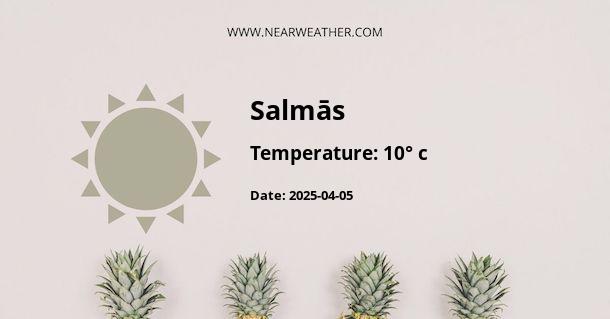Introduction
Salmas, located in the West Azerbaijan province of Iran, is a city with a rich history and a diverse climate. The city is known for its pleasant weather, breathtaking landscapes, and its unique climatic conditions. Nestled between mountains and vast plains, Salmas experiences a significant variation in weather patterns throughout the year. This article provides an in-depth overview of the climatic conditions and weather patterns in Salmas, Iran.
Geographical Location
Salmas is positioned at an altitude of 1367 meters above sea level, geographically situated at 38.2° North latitude and 44.8° East longitude. The city is surrounded by mountains, which contributes to its unique climate, and influences its weather patterns throughout the year.
Climate Classification
According to the Köppen Climate Classification, Salmas falls under the category of "Cold Semi-arid climates" (BSk). This climate type is characterized by low annual precipitation, cold winters, and warm summers.
Annual Weather Overview
Salmas experiences a significant variation in weather patterns throughout the year. Here’s a month-by-month breakdown of the typical weather conditions:
January
January is the coldest month in Salmas with an average temperature of -1.6°C. Snowfall is quite common during this month, making it a winter wonderland.
February
The cold weather continues in February with an average temperature of 0.1°C. The city experiences snowfall and occasional rainfall during this month.
March
In March, the temperature starts to rise, marking the beginning of spring. The average temperature during this month is 5.2°C.
April
April sees a further increase in temperature with an average of 11.1°C. This month marks the arrival of the spring season in full swing.
May
May is the beginning of the warm season, with an average temperature of 16.1°C. The city experiences moderate rainfall during this month.
June
June is the start of the summer season in Salmas, with an average temperature of 21.1°C. This is also the driest month of the year.
July
July is the warmest month in Salmas with an average temperature of 24.6°C. The city experiences hot and dry conditions during this month.
August
The temperature in August remains high, with an average of 24.1°C. This is the peak of the summer season in Salmas.
September
In September, the temperature starts to drop, marking the beginning of the autumn season. The average temperature during this month is 19.1°C.
October
October sees a further decrease in temperature with an average of 12.6°C. The city experiences moderate rainfall during this month, marking the arrival of the rainy season.
November
November is the start of the cold season in Salmas, with an average temperature of 6.1°C. The city experiences significant rainfall during this month.
December
December is a cold month in Salmas with an average temperature of 1.1°C. The city experiences snowfall and cold weather conditions during this month.
Annual Precipitation
The average annual precipitation in Salmas is approximately 400 mm. The wettest month is November, with an average rainfall of 52 mm, while the driest month is June, with an average rainfall of 5 mm.
Conclusion
In conclusion, Salmas, Iran, experiences a diverse range of weather conditions throughout the year, ranging from cold, snowy winters to warm, dry summers. The city's unique geographical location and altitude contribute significantly to its climate, making it a fascinating place for climate study and a beautiful destination for travelers seeking diverse weather experiences.
A - Salmās's Latitude is 38.197300 & Longitude is 44.765301.
A - Weather in Salmās is 10° today.
A - Climate Conditions in Salmās shows clear sky today.
A - Humidity in Salmās is 41% today.
A - Wind speed in Salmās is 6.41 km/h, flowing at 211° wind direction. today.
